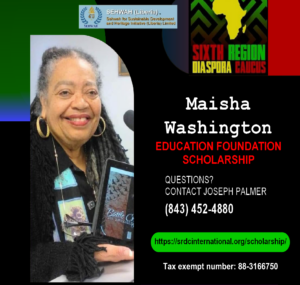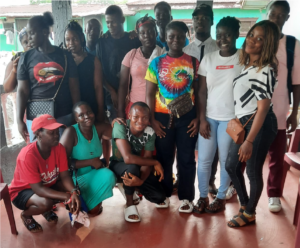 Sehwah-Liberia, Inc. and the Sixth Region Diaspora Caucus (SRDC) are announcing the Maisha Washington Education Foundation Scholarship for high school students in Liberia.
Sehwah-Liberia, Inc. and the Sixth Region Diaspora Caucus (SRDC) are announcing the Maisha Washington Education Foundation Scholarship for high school students in Liberia.
The Scholarship Program represents part of SRDC’s continuing efforts to build bridges between the Pan-African Diaspora and the African Community on the Continent, and Sehwah-Liberia’s continuing commitment to lift up the people of Liberia as the country continues to rise up from decades of civil war.
The Scholarship Program is named after Mama Maisha Washington, who as a member of the Maryland SRDC Organization and the Maryland Council of Elders (MCOE) had led efforts to launch a successful 2020 Pan African Summer Camp in Liberia, administered and taught by teachers in Liberia and the United States. Mama Maisha was also one of the leaders of the Pan-African Library Project, which will build the first-ever public library in Monrovia, Liberia, and which will primarily serve the countries of Liberia, Guinea-Conakry, Siera Leone and Cote D’Ivoire.
Mama Maisha transitioned to the Honored Ancestors in October 2020.
The initial goal of the Maisha Washington Education Foundation Scholarship is to grant educational scholarships to 150 high school students (9th, 10th, 11th and 12th graders) in Liberia during 2022, and to expand the Scholarship Program from there. Also, in support of the Pan-African Library Project, Liberian college-age students will be trained in Library Science to equip them to manage and operate the library once it is completed.
Another objective of the Scholarship Program will be to build relationships between Scholarship donors and students in Liberia who will benefit from the Scholarship Program. SRDC has included a Scholarship Program Donor Form, which can be completed by checking out the SRDC post at https://srdcinternational.org/maisha-washington-education-foundation-scholarship-fund/ or by visiting the Maisha Washington Education Foundation Web page at https://srdcinternational.org/scholarship/.
To make a tax-deductible donation to the Maisha Washington Education Foundation Scholarship Program using PayPal, please visit the SRDC post at https://srdcinternational.org/maisha-washington-education-foundation-scholarship-fund/ or the Maisha Washington Education Foundation Web page at https://srdcinternational.org/scholarship/.
Update: Maisha Washington Education Foundation Scholarship Fund Appeal for Donations and Support
The most recent fund raising letter discusses the current progress of the Scholarship Program and makes the following appeal for donations:
The Sixth Region Diaspora Caucus (SRDC) paid the school fees for 150 Liberian high school students for the 2021-2022 school year ($30.00 each).
We were able to raise $4,500.00 through the Maisha Washington Education Foundation Scholarship Fund to pay for those students’ school fees.
This money was collected through donations from people like you.
We need $4,500.00 (US dollars) to pay the school fees for another 150 students for the 2023 school year.
44 of those first 150 graduated students from 2021-2022 will be going to college in 2023. We also need $11,000 US dollars to sponsor those students’ yearly college fees for year 2023. ($250 each).
Thus, the total fundraising goal for this year is $15,500.00 ($4,500.00 plus $11,000.00).
Funds will be forwarded to our coordinating partner in Liberia (Sehwah-Liberia), under the leadership of Madam Louise M. W. Siaway.
Make your tax deductible donation (check) out to SRDC International.
Send your check by mail to:
Sixth Region Diaspora Caucus
3818 Crenshaw Blvd. #350
Los Angeles, CA 90008
Or donate online through our PayPal donate link at https://srdcinternational.org/scholarship/.
Thank you for your support.
Joe Palmer
843-452-4880

